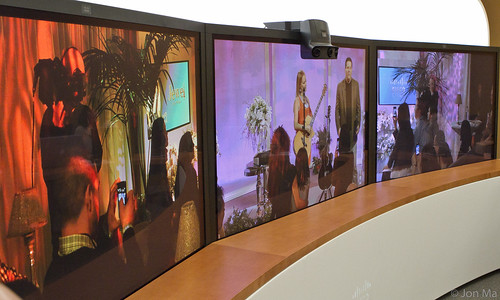Background for the CoIP project
A set of events and experiences have let to the decision of starting a conducting-over-ip (CoIP) project.
- UNINETT has some history in taking initiatives and participate in multi-media related demonstrations and experiments involving the Internet.
- UNINETT has been performing measurement on international connections for some years. Measurement show that the quality of the academic internet (see below) has now reached a level comparable to the traditional telephony systems, but with much higher capacity (100 times or more).
- Department of Telematics has a growing research group investigating future tele-presence architectures , i.e. how an advanced video telephone should operate. Users should have eye contact, see and hear each other in 3D, and ultimately forget all about the technology interconnecting them.
- Music collaboration over the internet is becoming popular, however due to delay constraints professional performers struggle to feel comfortable and perform optimally when online. A number of music collaboration experiments have been completed in the last decade, however the majority of the successful ones have relied on dedicated network resources.
- A church choir helds their performances typically in large church halls where acoustic delay and distortions are very common and indeed a part of the music genre. The choir conductor applies visual cues so conduct the choir. How well a choir can cope with visual delay is not well known.
- One of the conductors of Nidaros Cathedral choir has been on leave of absence in the Berkely, USA.
- Recently technical equipment has become available comencially which should enable high resolution and low delay transmission of realtime video-streams across internet connections.
These events spiked the idea of putting together a “Conducting over IP” project. Note that the initial ambitions where to set up a trans-atlantic session. However due to limited lack of partners in US and the physical distance the focus became national and trans-european.
What is the academic internet?
The over all internet is essentially a network of networks. Tens of thousends of companies, research and academic institutions operate their own IP based networks. They are call Internet Service Providers (ISP). All these ISPs are interconnected, and customers of one ISP may transmit data to customers of a different ISP. Data will flow directly between two ISPs if they have a direct (peer) connection between them. If not, data will transit one or more other ISPs before entering the destination ISP.
Most countries in the world have a dedicated research and educational ISP known as a National Educational and Research Network (NREN) . UNINETT and FCCN are such networks, Norwegian and Portuguese respectively. All NRENs are interconnected directly or via backbone networks operated in cooperation by NRENs. Hence when a Norwegian student sends data to a Portuguese student, the data will flow across only NREN-type of networks, i.e. the academic internet. It turns out most NRENs today have significantly more available capacity than other types of ISPs. Hence students and researcher have the option to communicate in advanced ways over their networks without having to negotiate for extra capacity or shorter delays.

